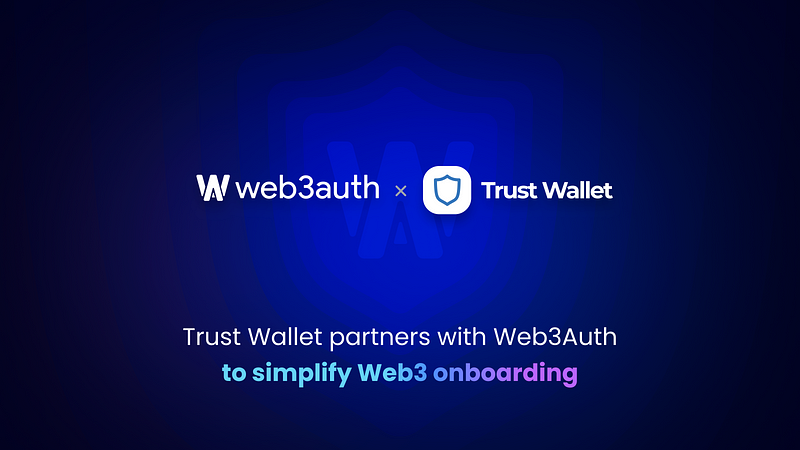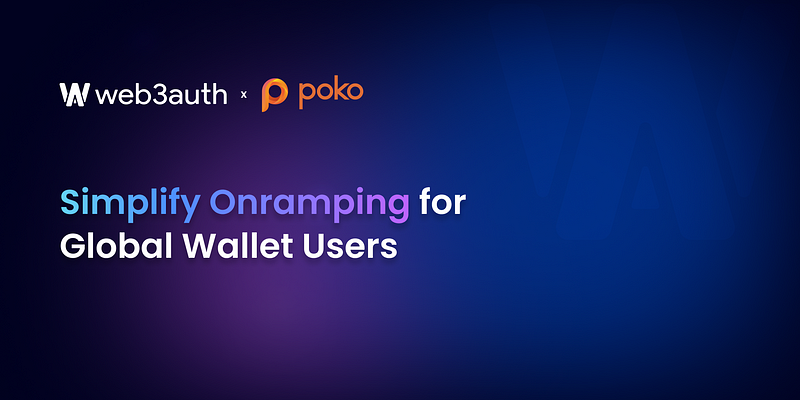Today, we announce our milestone partnership with Trust Wallet, one of the largest self-custodial and multi-chain wallets in Web3. Following the same, Trust Wallet can now enable users to seamlessly onboard and access Web3 services using their existing social login credentials, besides other security factors.
This collaboration marks another step towards improving the user experience and accelerating the mass adoption of Web3.
Trust Wallet’s newly deployed MPC (Multi-Party Computation) solution, powered by Web3Auth, eliminates the current requirement of a written-down seed phrase, safeguarding users from human error and a single point of failure. This further strengthens account safety and security by manyfold.
Users will be able to access Trust Wallet services directly and quickly using their existing Google, Apple, Telegram, and Discord accounts, significantly reducing the barrier to entry for new Web3 users. For enhanced security and ease-of-use, users also have the option to use SMS OTP and email recovery. Currently, the MPC feature is in its beta version and will be expanded to all users in the near future.
Eric Chang, Head of Product at Trust Wallet said, “This is a significant step for us because it benefits everyone involved. Users can now enjoy an easy-to-use experience while still choosing a self-custodial wallet to manage their cryptocurrencies. By integrating with Web3Auth, we keep providing greater user experience and long-term value to boost broader Web3 adoption.”
Previously, users had only two types of choices when it came to major wallets: a custodial solution with easier access but lower transparency, or a fully custodial solution with more risk and complexity.
This integration offers users additional options with the new MPC two-factor solution, enabling Trust Wallet users to simply explore the Web3 world across 70+ main blockchains in a seamless and secure way, while maintaining full ownership of their assets.
Prior to MPC Two Factor Wallets, users seeking a familiar user experience would have to rely on custodial wallets. However, this carries its own risks, with the FTX crash and Three Arrows Capital saga — exemplifying the risks of custody best with more than $20 billion lost in both events.
Self-custodial wallets came to the rescue but however, the user experience has been far from friendly or intuitive. One of the most viable solutions at this juncture is to empower users to switch to a fully self-custodial wallet solution which is also simpler and far more intuitive. Developing an in-built social login has been an extremely hard problem to solve for self-custodial wallet providers over the years now.
But not anymore.
With this partnership with Web3Auth, Trust Wallet users can now have a faster, intuitive and a more seamless login experience using social logins, and also have end-to-end control over their digital assets.
Zhen Yu Yong, Cofounder and CEO of Web3Auth said, “Lost seed-phrases are just very messy business, of course I have to mention the billions of dollars being lost in crypto every year. It’s time for seed-phrases to go away permanently. This is only the beginning of the long-term adoption of Two-Factor Wallets, and this partnership with Trust Wallet is a massive step forward for us, in our attempts to democratize enterprise-grade MPC for everyone.”
With data from its customers, Web3Auth reports that seed-phrases only have a conversion rate of about 15% to 22% while onboarding new users in Web3. With MPC technology, that number now shoots up massively to 62%.
The typical onboarding time with seed-phrases is about 5 to 15 mins. With Web3Auth’s MPC, Trust Wallet users can now onboard themselves in under 30 seconds, while transaction signing now happens with a latency time of as low as under a second.
But the perfect icing on the cake is that the MPC-powered Two-Factor Wallet (2FW) integration still continues to be as secure as it can get today, at a much higher standard of security than seed-phrases. To turbocharge the same, Web3Auth makes use of its newest in-built scheme DKLS-19, which is reported to be far more powerful, faster and a more modern version of existing MPC technology.
Frequently asked questions (FAQs)
- What is Multi-party Computation (MPC)?
In Multi-party computation (MPC), a user’s private key is divided into multiple different parts and stored across multiple devices. When a transaction needs to be signed on blockchain, these devices are dynamically called to ‘partial sign’ the transaction, which is taken to the frontend, to be able to reconstruct the final signature. This means the entire private key is always available to use but never stored in a single location. In today’s Web3, MPC empowers Two-Factor Wallets (2FW) and Multi-Factor Authentication (MFA) tremendously. It compels end-users to securely and intuitively manage the user keys by using multiple authentication factors, instead of having to rely on a single seed-phrase. The solution is to offer a familiar, web2-like login experience to both web3 and web3 users, by allowing them to login via their social logins via multiple factors (Multi-Factor Authentication) like email, social media accounts, telegram, discord, among others.
- What is self-custody?
No parties or subsets of parties can access the user’s public and private key pair. The user has full access over their public and private key pair. Self-custody represents that a user has full control over their key and their assets and custodial means that a third party handles a user’s key and assets on their behalf.
- What is Trust Wallet and what does it do?
Trust Wallet is a secure, open-source, decentralized and anonymous mobile wallet application that supports Ethereum and over 40,000 different Ethereum based tokens (ERC20, ERC223, and ERC721). Trust Wallet allows users to send, receive, and store digital assets, while retaining complete control over their private keys. In addition to being a cryptocurrency wallet, it also functions as a Web3 browser that allows users to interact with decentralized applications (DApp) directly from the app.
Trust Wallet now enables social logins for its consumers via its integration with MPC-powered wallet-as-a-service (WaaS) infrastructure Web3Auth. Trust Wallet users now have a familiar-looking web2-like login experience with an option to access the wallet through their social logins and multiple factors (Multi-Factor Authentication) like email, social media accounts, telegram, discord, among others.





